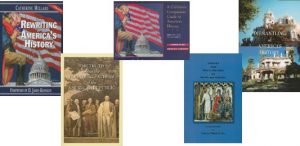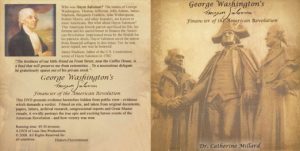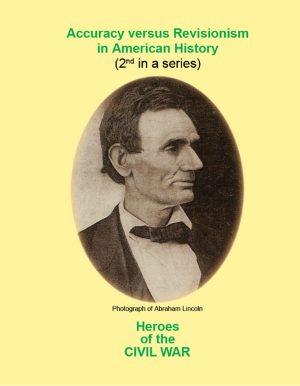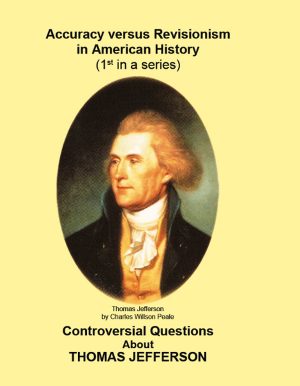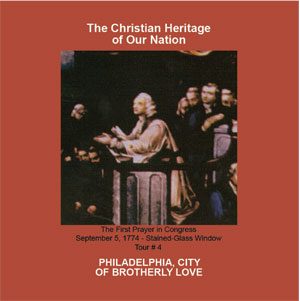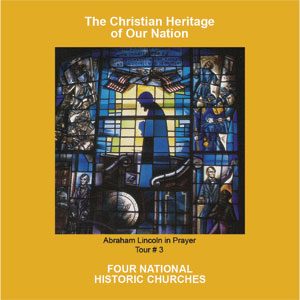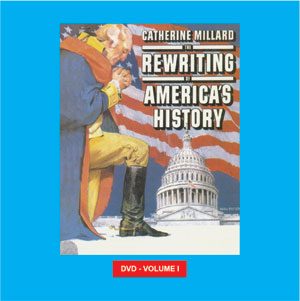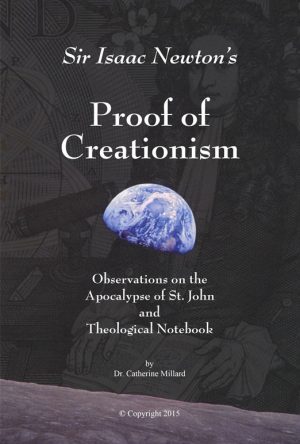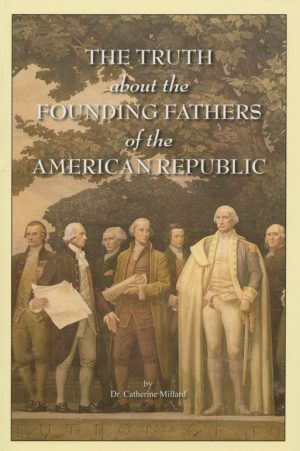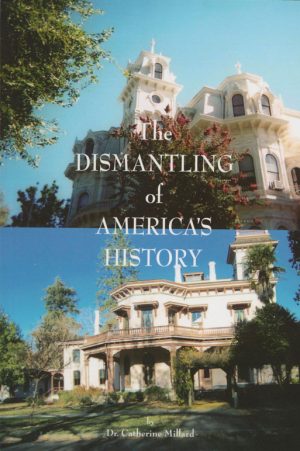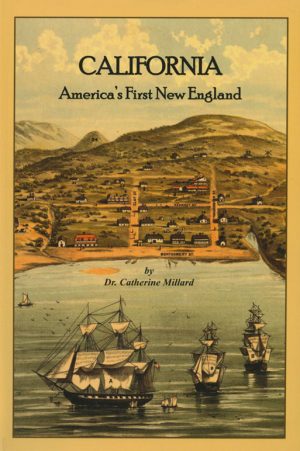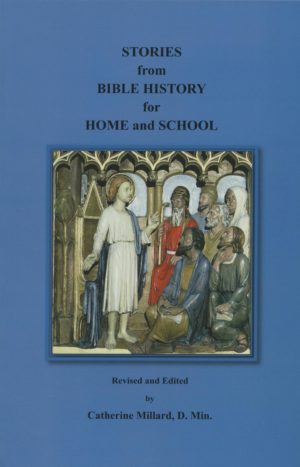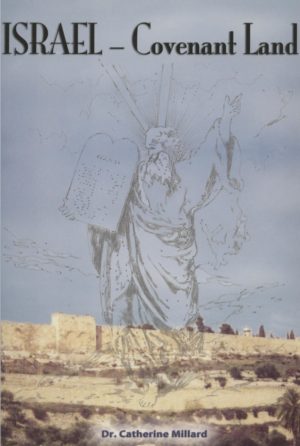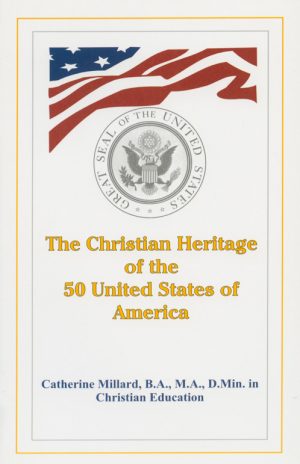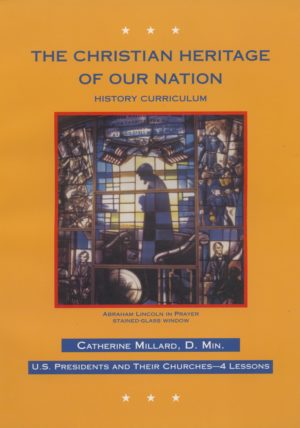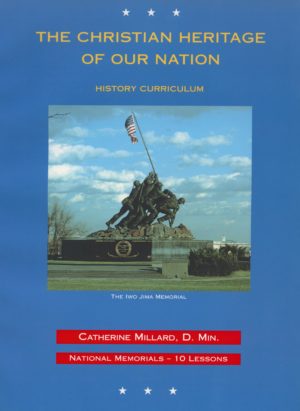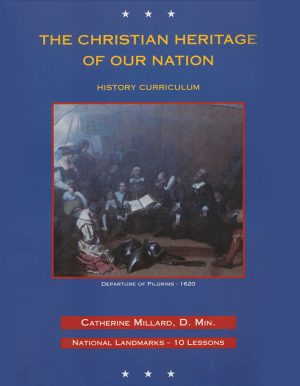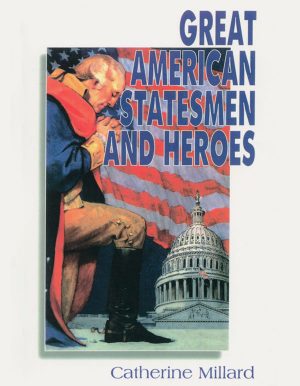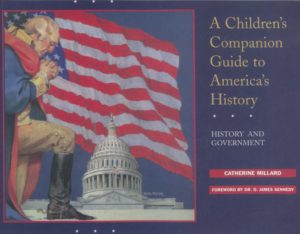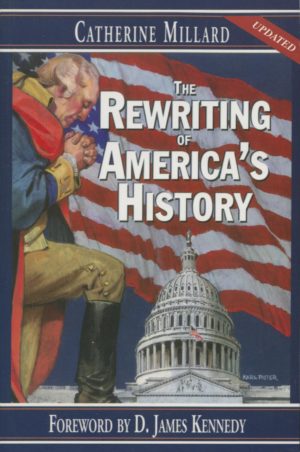Abraham and Mary Todd Lincoln
Abraham Lincoln, the 16th president of the United States, came from humble origins. He was born in Hardin County, Kentucky in 1809, and then moved with his family to Gentryville, Indiana. He lived in a plain cabin with a dirt floor, beds made of dried leaves and stools and table formed of logs.
His mother’s only book was a Bible, from which Lincoln was taught and nurtured each day. She taught him to base his entire life upon the contents of that book. At his mother’s untimely death when the boy was ten years old, Lincoln knew much of the Word of God almost by heart. Many years later, as president of the United States, Lincoln is quoted as having said: “All that I am or hope to be, I owe to my angel mother. Blessings on her memory!” The second book Lincoln read was John Bunyan’s Pilgrim’s Progress, followed by Pastor Mason L. Weem’s Life of Washington and Daniel Defoe’s Robinson Crusoe. Lincoln, being thirsty for knowledge, walked six miles in order to obtain a grammar book. At night, he would study diligently by the light given out through the burning of shavings, candles being too expensive for his meager wages.
A hard-working lad, Lincoln was not always paid in money for his work. It is remembered that once, for a certain Mrs. Miller, he split 400 rails for every yard of brown jeans, dyed with white walnut bark, necessary to make a pair of trousers. Honesty, hard work and integrity became his hallmarks.
Six feet, four inches tall, Lincoln was known to have had a big heart and thus his nickname: “Honest Abe.” This name was acquired because of his scrupulous honesty, as attested to by the example: While managing a mill and store at New Salem, Lincoln overcharged a woman six and a quarter cents. When the error came to his attention, night had fallen. This did not deter Lincoln, who walked several miles to return her money to her. Another woman bought a half pound of tea. Afterwards, to his dismay, he found that he had used a four-ounce weight on the scales and thus walked a long way to return the funds to her.
His mother’s life and example ever being before his eyes, he insisted on politeness in front of women. One day, a boorish man used profane speech in front of two ladies. Lincoln asked him to desist. The man subsequently became angered, so young Abraham announced: “Well, if you must be whipped, I suppose I may as well whip you as any other man,” and he gave him a severe punishing. The man became a polite individual, and Lincoln’s friend for life.
Upon witnessing the auction of slaves, Lincoln is reported to have said: “By the grace of God I’ll make the ground of this country too hot for the feet of slaves.”1
A quaint story is passed down about an old black woman coming to the door of the White House to meet the president as he left. She asked to see “Abraham the Second.” “And who was Abraham the First?” asked Lincoln. “Why, Lor’ bless you, we read about Abraham de First in de Bible, and Abraham de Second is de President.” “Here he is,” said Lincoln, overcome with emotion.
Lincoln’s magnificent Gettysburg Address, delivered at Gettysburg, Pennsylvania, on November 19, 1863, was the shortest speech any United States president ever gave, being two minutes in length. Lincoln was wrong when he said: “The world will little note, nor long remember, what we say here…” Inscribed within the Lincoln Memorial in the nation’s capital, his words are memorialized for millions of American schoolchildren. They continue to touch the hearts of all who read these simple, but deeply moving words, and to challenge the citizens of every generation to assume responsibility for their nation and its unique problems in history. Here is the address in its entirety:
Fourscore and seven years ago our fathers brought forth on this continent a new nation, conceived in liberty, and dedicated to the proposition that all men are created equal. Now we are engaged in a great civil war, testing whether that nation, or any nation so conceived and so dedicated can long endure. We are met on a great battlefield of that war. We have come to dedicate a portion of that field as a final resting-place for those who here gave their lives that that nation might live. It is altogether fitting and proper that we should do this. But in a larger sense, we cannot dedicate, we cannot consecrate, we cannot hallow this ground. The brave men, living and dead, who struggled here, have consecrated it far above our poor power to add or detract. The world will little note, nor long remember, what we say here, but it can never forget what they did here. It is for us, the living, rather to be dedicated here to the unfinished work which they who fought here have thus far so nobly advanced. It is rather for us to be here dedicated to the great task remaining before us, that from these honored dead we take increased devotion to that cause for which they gave the last full measure of devotion; that we here highly resolve that these dead shall not have died in vain; that this nation, under God, shall have a new birth of freedom, and that government of the people, by the people, for the people shall not perish from the earth.
Lincoln was the first United States president to use the term: “This nation under God” in reference to this country. After his death, in 1865, on each succeeding February 12, a “Lincoln Day Observance Service” is held at the New York Avenue Presbyterian Church, his parish church, situated just two blocks from the White House. In 1954, Dwight Eisenhower was in attendance with his wife at this service. He was so moved by George Docherty’s sermon entitled “Under God,” taken from Lincoln’s words, that he initiated action in Congress to have it permanently made a part of the Pledge of Allegiance: “I pledge allegiance to the Flag of the United States of America and to the Republic for which it stands, One Nation Under God, indivisible, with liberty and justice for all.”
Among the treasures in the safekeeping of the Rare Book Collection of the Library of Congress, is Abraham Lincoln’s 1847 Family Bible (unclassified), with his family records inscribed within; Mrs. Abraham Lincoln’s 1854 Bible, with her own hand-written words therein as follows:
This Holy Bible is presented
to my dear son’s eldest daughter, by her
affectionate Grandmother,
Mary Lincoln
October 16, 1872;
and Abraham Lincoln’s Presidential Inaugural Bible, upon which he took his oath of office, his left hand resting upon its contents.
William J. Wolf in his book entitled The Religion of Abraham Lincoln wrote:
No president has ever had the detailed knowledge of the Bible that Lincoln had. No president has ever woven its thoughts and its rhythms into the warp and woof of his state papers as he did.
This is evidenced in his “Second Inaugural Address,” where Lincoln incorporated three magnificent Scriptures – Matthew 7:1, 18:7 and Revelation 16:7 – into his speech. He also spoke quite openly about the Bible, the Word of God and prayer in this discourse referring to Almighty God seven times.
While Abraham Lincoln was a man of few words, his words bore great weight. In characteristic fashion, he opened his “Second Inaugural Address” by stating that an extended address was not needed since this was a continuation of his first term as president. Aptly, a major portion of the address is given to the Civil War. It is fitting to view the words of this great president and statesman, for they bear in them the wisdom of the Word of God, and his concern to foster healing and restoration for the entire nation. Inscribed upon the North Wall of the Lincoln Memorial in the nation’s capital, they are here reprinted for all to read: 2
At this second appearing to take the oath of the Presidential office there is less occasion for an extended address than there was at the first. Then a statement somewhat in detail of a course to be pursued seemed fitting and proper. Now, at the expiration of four years, during which public declarations have been constantly called forth on every point and phase of the great contest which still absorbs the attention and engrosses the energies of the nation, little that is new could be presented. The progress of our arms, upon which all else chiefly depends, is as well known to the public as to myself, and it is, I trust, reasonably satisfactory and encouraging to all. With high hope for the future, no prediction in regard to it is ventured.
On the occasion corresponding to this four years ago all thoughts were anxiously directed to an impending civil war. All dreaded it, all sought to avert it. While the inaugural address was being delivered from this place, devoted altogether to saving the Union without war, insurgent agents were in the city seeking to destroy it without war – seeking to dissolve the Union and divide effects by negotiation. Both parties deprecated war, but one of them would make war rather than let the nation survive, and the other would accept war rather than let it perish, and the war came.
One-eighth of the whole population were colored slaves, not distributed generally over the Union, but localized in the southern part of it. These slaves constituted a peculiar and powerful interest. All knew that this interest was somehow the cause of the war. To strengthen, perpetuate, and extend this interest was the object for which the insurgents would rend the Union, even by war; while the Government claimed no right to do more than to restrict the territorial enlargement of it. Neither party expected for the war the magnitude or the duration which it has already attained. Neither anticipated that the cause of the conflict might cease with, or even before, the conflict itself should cease. Each looked for an easier triumph, and a result less fundamental and astounding. Both read the same Bible and pray to the same God, and each invokes His aid against the other. It may seem strange that any men should dare to ask a just God’s assistance in wringing their bread from the sweat of other men’s faces, but let us judge not, that we be not judged.3 The prayers of both could not be answered. That of neither has been answered fully. The Almighty has His own purposes. “Woe unto the world because of offenses; for it must needs be that offenses come, but woe to that man by whom the offense cometh. 4 If we shall suppose that American slavery is one of those offenses which, in the providence of God, must needs come, but which, having continued through His appointed time, He now wills to remove, and that He gives to both North and South this terrible war as the woe due to those by whom the offense came, shall we discern therein any departure from those divine attributes which the believers in a living God always ascribe to Him? Fondly do we hope, fervently do we pray, that this mighty scourge of war may speedily pass away. Yet, if God wills that it continue until all the wealth piled by the bondsmen’s two hundred and fifty years of unrequited toil shall be sunk, and until every drop of blood drawn with the lash shall be paid by another drawn with the sword, as was said three thousand years ago, so still it must be said, “the judgments of the Lord are true and righteous altogether.”5 With malice toward none, with charity for all, with firmness in the right as God gives us to see the right, let us strive on to finish the work we are in, to bind up the nation’s wounds, to care for him who shall have borne the battle and for his widow and his orphan – to do all which may achieve and cherish a just and lasting peace among ourselves and with all nations.
Mary Todd Lincoln
Abraham Lincoln’s wife, Mary Todd Lincoln, has been particularly maligned. All the original documents, writings and letters pertaining to Mary Todd Lincoln that I have consulted, show a woman of deep Christian faith, commitment to her family and church (New York Avenue Presbyterian Church) and a commendable wife to Abraham Lincoln…
The following letter written by Mrs. Mary Todd Lincoln to her pastor from the Executive Mansion on May 22, 1865, shows the deep gratitude for the friendship and sympathy demonstrated to her bereaved family, after her husband’s tragic assassination on April 14, 1865:
Rev. Dr. Gurley
My Dear Sir:
Please accept as a memento, of the very kind regard entertained for you by my Beloved Husband, the hat worn by him, for the first and only time, at his Second Inauguration. While its intrinsic value is trifling, you will prize it, for the associations that cluster around it. If anything can cast a ray of light across my dreary and blighted pathway, the recollection of your Christian kindness, extended to myself and family in our heavy bereavements will ever be most gratefully cherished. With love to Mrs. Gurley, I remain,
Your heart broken friend,
Mary Lincoln.
(Mrs. Lincoln died July 16, 1882 at the home of her sister, Mrs. Edwards, in Springfield, Illinois.) 6
Let us now study Mary Todd Lincoln’s own intimate letters to her confidante, friend and employee, Elizabeth Keckley, who published them in 1868 in her book entitled: Behind the Scenes, Thirty Years a Slave and Four Years in the White House. In the Introduction to a later edition of this book, we read:
…However, Robert Lincoln rebuked Mrs. Keckley for publishing his mother’s letters. He refused to accept the author’s explanation, and prevailed upon the publisher to suppress the book. Behind the Scenes was recalled from the market and all available copies were bought up by “friends of Mr. Lincoln.” Elizabeth Keckley realized nothing from the sale of the book and suffered a decline of patronage in her dressmaking business. Some of her best friends even felt that the book was harmful to other Negroes similarly employed….Mrs. Keckley’s book reveals more clearly the intimate family life of the martyred president and offers a more credible portrait of marry Todd, than perhaps any other book about the Lincolns. 7
The following are excerpts from Mary Todd Lincoln’s published letters:
Chicago, December 27:
Dear Lizzie:
I wrote you a few lines on yesterday…I believe any more newspaper attacks would lay me low. As influence has passed away from me with my husband, my slightest act is misinterpreted. “Time makes all things right.” I am positively suffering for a decent dress. I see Mr. A. and some recent visitors eyeing my clothing askance. Do send my black merino dress to me very soon; I must dress better in the future….
Write,
Yours,
Mary Lincoln…. 8
Clifton House, January 12:
My dear Lizzie: Your last letter was received a day or two since. I have moved my quarters to this house, so please direct all your letters here….Your letter announcing that my clothes were to be paraded in Europe – those I gave to you – has almost turned me wild. Robert would go raving distracted if such a thing was done. If you have the least regard for our reason, pray write to the Bishop that it must not be done. How little did I suppose you would do such a thing; you cannot imagine how much my overwhelming sorrows would be increased. May kind Heaven turn your heart, and have you write that this exhibition must not be attempted. Robert would blast us all if you were to have this project carried out. Do remember us in our unmitigated anguish, and have those clothes, worn on those fearful occasions, recalled. I am positively dying with a broken heart, and the probability is that I shall be living but a very short time. May we all meet in a better world, where such grief is unknown. Write me all about yourself….For the sake of humanity, if not me and my children, do not have those black clothes displayed in Europe. The thought has almost whitened every hair on my head. Write when you receive this.
Your friend,
Mary Lincoln. 9
The above suppressed correspondence from Mary Todd Lincoln to her confidante and friend show overwhelming grief at the announcement that the intimate Lincoln family mourning clothes would be paraded throughout Europe as museum pieces. It also graphically exposes the derogatory newspaper attacks on the person and character of Mrs. Lincoln in the wake of her husband’s death, the latter having had many enemies during his lifetime.
As far as Mary Lincoln’s impeccable qualities as a supportive wife and mother, this is amply proven by Keckley’s eyewitness account of President Abraham Lincoln and his wife’s devoted husband-wife relationship, to which she was a first hand observer for four years in the White House:
…The day after the levée I went to the White House and while fitting a dress to Mrs. Lincoln, she said:
“Lizabeth, I have a idea. These are war times and we must be as economical as possible. You know the President is expected to give a series of state dinners every winter, and these dinners are very costly…the state dinner can be scratched from the programme. What do you thing, Lizabeth?”
“I think you are right, Mrs. Lincoln.”
“I am glad to hear you say so. If I can make Mr. Lincoln take the same view of the case, I shall not fail to put the idea into practice.”
Before I left her room that day, Mr. Lincoln came in. She at once stated the case to him. He pondered the question a few moments before answering.
“Mother, I am afraid your plan will not work.”
“But it will work, if you will only determine that it shall work.”
“It is breaking in on the regular custom,” he mildly replied.
“But you forget, father, these are war times, and old customs can be done away with for the once. The idea is economical, you must admit.”
“Yes, mother, but we must think of something besides economy…I believe you’re right, mother. You argue the point well. I think that we shall have to decide on the receptions.”
So the day was carried. The question was decided, and arrangements were made for the first reception. It now was January, and cards were issued for February.10
Another similar account is given below:
…Finding that Willie continued to grow worse, Mrs. Lincoln determined to withdraw her cards of invitation and postpone the reception. Mr. Lincoln thought that the cards had better not be withdrawn. At least he advised that the doctor be consulted before any steps were taken. Accordingly, Dr. Stone was called in. He pronounced Willie better, and said that there was every reason for an early recovery.
He thought, since the invitations had been issued, it would be best to go on with the reception. Willie, he insisted, was in no immediate danger. Mrs. Lincoln was guided by these counsels, and no postponement was announced. On the evening of the reception Willie was suddenly taken worse. His mother sat by his bedside a long while, holding his feverish hand in her own, and watching his labored breathing. The doctor claimed there was no cause for alarm. I arranged Mrs. Lincoln’s hair, then assisted her to dress. Her dress was white satin, trimmed with black lace. The trail was very long, and as she swept through the room, Mr. Lincoln was standing with his back to the fire, his hands behind him, and his eyes on the carpet. His face wore a thoughtful, solemn look. The rustling of the satin dress attracted his attention. He looked at it a few moments; then, in his quaint, quiet way remarked:
“Whew! Our cat has a long tail tonight.”
Mrs. Lincoln did not reply. The President asked: “Mother, it is my opinion, if some of that tail was nearer the head, it would be in a better style;” and he glanced at her bare arms and neck. She had a beautiful neck and arm, and low dresses were becoming to her. She turned away with a look for offended dignity, and presently took the President’s arm and both went downstairs to their guests, leaving me alone with the sick boy…. The brilliance of the scene could not dispel the sadness that rested upon the face of Mrs. Lincoln. During the evening she came upstairs several times, and stood by the bedside of the suffering boy. She loved him with a mother’s heart, and her anxiety was great. The night passed slowly; morning came, and Willie was worse. He lingered a few days, and died. God called the beautiful spirit home, and the house of joy was turned into the house of mourning….Mr. Lincoln came in. I never saw a man so bowed down with grief. He came to the bed, lifted the cover from the face of his child, gazed at it long and earnestly, murmuring, “My poor boy, he was too good for this earth. God has called him home. I know that he is much better off in heaven, but then we loved him so. It is hard, hard to have him die!” Great sobs choked his utterance. He buried his head in his hands, and his tall frame was convulsed with emotion….His grief unnerved him, and made him a weak, passive child. I did not dream that his rugged nature could be so moved. I shall never forget those solemn moments – genius and greatness weeping over love’s idol lost….Mrs. Lincoln’s grief was inconsolable. The pale face of her dead boy threw her into convulsions…Willie, she often said, if spared by Providence, would be the hope and stay of her old age. But Providence had not spared him….Mrs. Lincoln was so completely overwhelmed with sorrow that she did not attend the funeral.11
Nathaniel Parker Willis left a touching account of the Lincoln family in the aftermath of their young son’s death. It is here excerpted:
…He was his father’s favorite. They were intimates – often seen hand-in-hand. And there sat the man, with a burden on his brain at which the world marvels – bent now with the load at both heart and brain – staggering under the blow like the taking from him of his child!
His men of power sat around him – McClellan, with a moist eye when he bowed in prayer, as I could see from where I stood; and Chase and Seward, with their austere features at work; and senators, and ambassadors, and soldiers, all struggling with their tears – great hearts sorrowing with the President as a stricken man and a brother. That God may give him strength for all his burdens is, I am sure, at present the prayer of a nation.”12
Mrs. Lincoln’s seamstress continues:
This sketch was very much admired by Mrs. Lincoln. I copy it from the scrap-book in which she pasted it, with many tears, with her own hands…13
As a fitting memorial and tribute to the 16th president, let us remember his life and deeds, as expressed by one who knew him well, his pastor, Dr. Phineas D. Gurley – one who prayed with him at his deathbed, helping Mrs. Lincoln and her son, Tad, through their dark night of trial:
‘HAVE FAITH IN GOD’ – Mark 11:22
A Sermon
Delivered in the East Room of the Executive Mansion
Wednesday, April 19, 1865
At
THE FUNERAL OF ABRAHAM LINCOLN,
PRESIDENT OF THE UNITED STATES
By
REV. P.D. GURLEY, D.D.
PASTOR OF THE NEW YORK AVENUE
PRESBYTERIAN CHURCH, WASHINGTON, D.C.
AS WE STAND HERE TODAY, MOURNERS AROUND THIS COFFIN AND AROUND THE LIFELESS REMAINS OF OUR BELOVED CHIEF MAGISTRATE, WE RECOGNIZE, AND WE ADORE THE SOVEREIGNTY OF GOD. His throne is in the Heavens, and His kingdom ruleth over all. He hath done, and He hath permitted to be done, whatsoever He please.
…The people confided in the late lamented President with a full and loving confidence. Probably no man since the days of Washington was ever so deeply and firmly embedded and enshrined in the very hearts of the people as Abraham Lincoln. Nor was it a mistaken confidence and love. He deserved it – deserved it well – deserved it all. He merited it by his character, by his acts, and by the whole tenor, and tone, and spirit of his life. He was simple and sincere, plain and honest, truthful and just, benevolent and kind. His perceptions were quick and clear, his purposes were good and pure beyond question. Always and everywhere he aimed and endeavored to be right and to do right…
He saw his duty as the Chief Magistrate of a great and imperiled people, and he determined to do his duty, and his whole duty, seeking the guidance and leaning upon the arm of Him of whom it is written, “He giveth power to the faint, and to them that have no might He increaseth strength.” Yes, he leaned upon His arm, He recognized and received the truth that the “kingdom is the Lord’s, and He is the governor among the nations.” He remembered that “God is in history,” and he felt that nowhere had His hand and His mercy been so marvelously conspicuous as in the history of this nation. He hoped and prayed that that same hand would continue to guide us, and that same mercy continue to abound to us in the time of our greatest need. I speak what I know, and testify what I have often heard him say, when I affirm that that guidance and mercy were the props upon which he humbly and habitually leaned; they were the best hope he had for himself and for his country. Hence, when he was leaving his home in Illinois, and coming to this city to take his seat in the executive chair of a disturbed and troubled nation, he said to the old and tried friends who gathered tearfully around him and bade him farewell, “I leave you with this request: pray for me.” They did pray for him, and millions of other people prayed for him; nor did they pray in vain. Their prayer was heard, and the answer appears in all his subsequent history; it shines forth with a heavenly radiance in the whole course and tenor of his administration, from its commencement. Nor was it merely by strength of mind, and honestly of heart, and purity and pertinacity of purpose, that He furnished him; in addition to these things, He gave him a calm and abiding confidence in the overruling Providence of God and in the ultimate triumph of truth and righteousness through the power and the blessing of God…
Never shall I forget the emphasis and the deep emotion with which he said in this very room, to a company of clergymen and others, who called to pay him their respects in the darkest days of our civil conflict: “Gentlemen, my hope of success in this great and terrible struggle rests on that immutable foundation, the justice and goodness of God. And when events are threatening, and prospects very dark, I still hope that in some way which man cannot see all will be well in the end, because our cause is just, and God is on our side…”
He is dead; but the God in whom he trusted lives, and He can guide and strengthen his successor as He guided and strengthened him…but the cause he so ardently loved survives his fall, and will survive it… 14
To learn more, click here.
____________________
Bibliography:
1American Bar Association Committee on American Citizenship: Washington, Lee and Lincoln, The Great Triumvirate Among the Makers of America. Dallas, 1924, p. 25.
2Lincoln, Abraham. Second Inaugural Address, 1865. Inscribed on North Wall of Lincoln Memorial, Washington, D.C.
3Matthew 7:1
4Matthew 18:7
5Revelation 16:7
6Edgington, Frank E. History of the New York Avenue Presbyterian Church. Washington, D.C.: New York Avenue Presbyterian Church, 1961, pp. 252, 253.
7Keckley, Elizabeth. Behind the Scenes – Thirty years a Slave and Four years in the White House. New York: Arno Press and the New York Times, 1968. (Reprinted from the original 1868 copy in the collection of Princeton University), Introduction.
8Ibid., pp. 363-364.
9Ibid., pp. 364-366.
10Ibid., pp. 95-97.
11Ibid., pp. 100-105.
12Ibid., pp. 109-110.
13Ibid. p. 110.
14Gurley, Phineas D. Funeral Sermon for Abraham Lincoln. Presbyterian Historical Society, Philadelphia, Pennsylvania.
